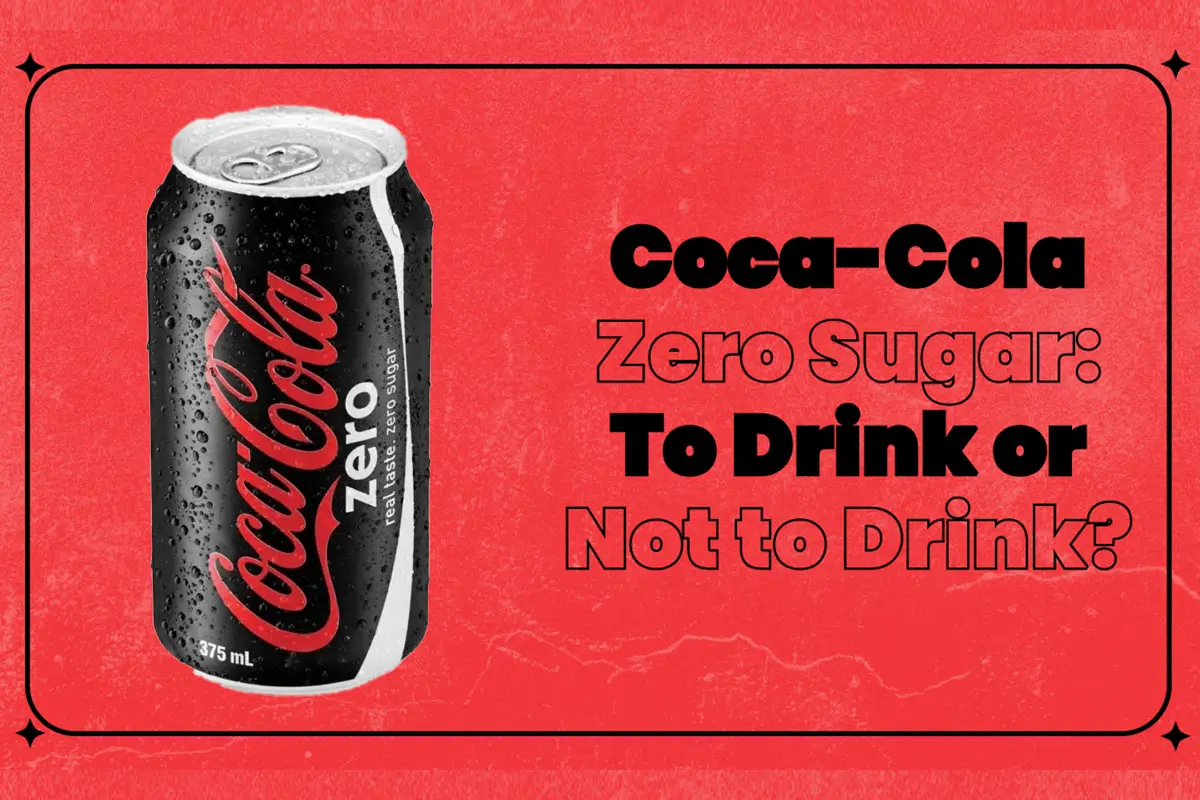Coca-Cola Zero Sugar: To Drink or Not to Drink?

For someone who’s trying to cut down on calories, a Zero Coke seems like a dream come true! It tastes just as good as Coke but it promises to be a calorie-free soda, giving you an opportunity to enjoy your favorite drink without the guilt. But what is really going on inside that can of soda? Let’s take a closer look at what’s bubbling under the surface and learn about the ingredients of a Zero Coke to see what medicine and research say about drinking it.
Table of Contents
What’s Inside a Can of Zero Coke?
From the very first day, Zero Coke was marketed as the sugar-free alternative to regular Coca-Cola. But how does it create the same taste without using any sugar? Let’s see.
The key ingredients in Zero Coke are:
- Aspartame: A low-calorie artificial sweetener.
- Acesulfame Potassium (Ace-K): Another sweetener that enhances flavor.
- Carbonated Water, Flavorings, and Additives: These items create that signature taste and fizz we all seek in a can of soda.
But the star player among these ingredients is “Aspartame”. According to the FDA, aspartame is used widely in “diet” products.
Aspartame: Is It Our Friend or Enemy?
Aspartame is an artificial sweetener that is about 200 times sweeter than sugar but contains only 4 calories per gram. So, using it allows Zero Coke to taste just as sweet as regular Coke (even sweeter) without spiking your calorie count. However, aspartame has long been a topic of debate. A can of Zero Coke (330ml) contains about 180mg of aspartame, based on Coca-Cola’s ingredient disclosures. But is this amount safe?
What’s the Safe Limit?
According to the European Food Safety Authority (EFSA), the acceptable daily intake (ADI) of aspartame is 40mg per kilogram of body weight [1]. For example, if you weight 60kg (around 132 pounds), this means you can have about 13 cans of Zero Coke per day! The FDA sets an even higher limit at 50mg/kg/day [2]. So, it seems like drinking a can or two of Zero Coke a day puts you at absolutely no risk according to research. But here’s the catch: long-term effects of aspartame are still not clear.
The Long-Term Effects of Aspartame
Here are the main concerns about aspartame:
Is It Linked to Cancer?
A 2006 study by the Ramazzini Institute suggested a link between aspartame and certain cancers in rats and further studies have backed up these results [3]. However, these findings were challenged by organizations like the World Health Organization (WHO), which deemed aspartame safe at normal consumption levels. But this is still a topic in debate and needs further research and examination.
Does It Affect the Brain?
Aspartame breaks down into phenylalanine, aspartic acid, and methanol in the body. High levels of phenylalanine may affect neurotransmitters in sensitive individuals, as suggested by a study by international immunopharmacology [4].
How Does it Affect your Gut Health?
Recent research, such as a 2024 paper in Frontiers in Nutrition, has shown that artificial sweeteners like aspartame may affect gut bacteria, potentially impacting digestion and metabolism [5].
Taking a Look at the Pros and Cons
Let’s break down the pros and cons:
The Good Stuff
- No Sugar, No Calories: This can be a great choice for the ones who are trying to watch their calorie intake.
- Blood Sugar-Friendly: Zero Coke is also a smart choice for diabetics compared to other sugary drinks.
- Taste Without the Guilt: For many, it satisfies cravings without compromising their diet.
The Not-So-Good Stuff
- Artificial Sweeteners: Aspartame and Ace-K remain controversial. We still have to examine and study many aspects to learn about their potential long-term effects.
- No Nutritional Value: A Coke is still a Coke! So, even if it doesn’t necessarily harm your body it is still flavored water with fizz and it comes with absolutely no nutritional value.
At Last, Should I Drink Zero Coke?
If you love the taste of soda but hate the calories, Zero Coke is a good occasional treat. It’s safe within recommended limits, as studies confirm, but relying on it as a daily habit might not be the best choice for overall health.
Instead of thinking of Zero Coke as a “healthy” alternative, treat it as what it is: a low-calorie soda with potential drawbacks. For truly healthy alternatives you should go for options like natural juices, and never forget about staying hydrated (8 glasses of water, and no, other drinks don’t count as water!)
References
[1] https://www.efsa.europa.eu/sites/default/files/corporate_publications/files/factsheetaspartame.pdf
[2] https://www.fda.gov/food/food-additives-petitions/aspartame-and-other-sweeteners-food
[3] https://pmc.ncbi.nlm.nih.gov/articles/PMC8042911/
[4] https://www.sciencedirect.com/science/article/abs/pii/S1567576924008154
[5] https://www.frontiersin.org/journals/nutrition/articles/10.3389/fnut.2024.1366409/full





